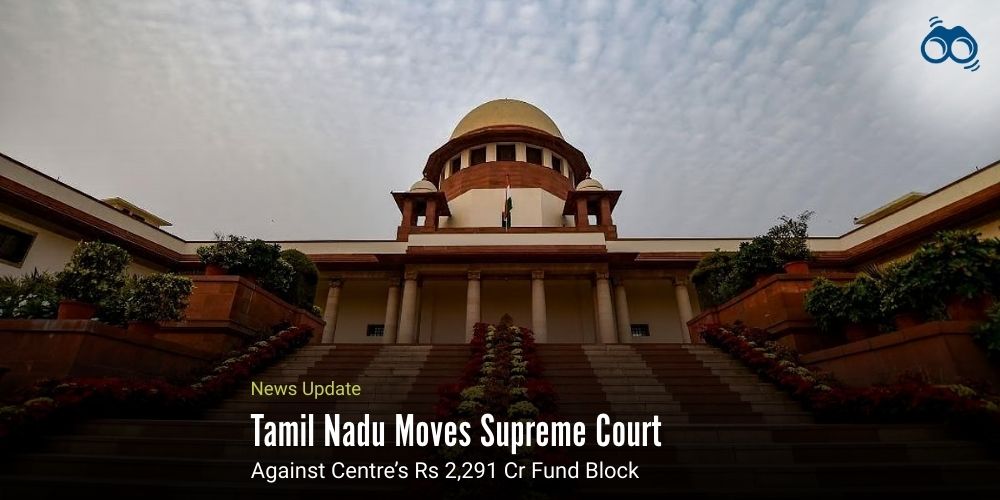Tamil Nadu Seeks Legal Remedy Against Alleged Withholding of ₹2,291 Crore in Education Grants
Dispute Arises Between Tamil Nadu and Centre Concerning NEP-Linked Education Funding
Education funding forms the cornerstone of a nation’s development, ensuring equitable access to learning and fostering innovation. However, disputes over financial allocations can sometimes escalate into legal challenges, reflecting deeper tensions between state and central authorities.
In a significant development, the Tamil Nadu government has approached the Supreme Court, alleging that the Central government has unlawfully withheld over ₹2,291 crore in education funds. The state contends that this financial pressure is being exerted to coerce states into implementing the National Education Policy (NEP) 2020 and associated initiatives, such as the PM SHRI Schools scheme, which aims to promote NEP through model schools. To challenge this, Tamil Nadu has invoked Article 131 of the Indian Constitution, which allows states to legally contest actions taken by the Centre in matters involving constitutional or legal rights. The state has reportedly sought the immediate release of ₹2,291.30 crore under the Samagra Shiksha Scheme (SSS), a central initiative aimed at supporting inclusive, equitable quality education, particularly for underprivileged children.
According to Tamil Nadu, this sum includes ₹2,151.59 crore as the Centre’s 60% share of sanctioned funds for the financial year 2024–25, in addition to 6% annual interest from 1 May 2025 until the payment is made. The state further stated that its proposal had been approved by the Project Approval Board (PAB) on 16 February 2024, with full compliance with scheme guidelines acknowledged. Despite this, the state alleged in its petition that, as of 21 May 2025, no funds had been released by the Centre. The Tamil Nadu government claimed that the Centre’s actions were not only unconstitutional and arbitrary, but also a violation of federal principles. It argued that the NEP and PM SHRI were policy frameworks rather than laws, and thus not legally binding on states. Consequently, withholding funds for non-implementation, it asserted, amounted to a breach of constitutional norms.
In support of its position, Tamil Nadu referred to a prior Supreme Court ruling that rejected a plea to compel the state to implement NEP 2020, including its contentious three-language formula, which incorporates Hindi, a politically sensitive issue in Tamil Nadu. The Court had clarified that Article 32 of the Constitution is intended to protect fundamental rights, not to enforce policy decisions upon states. Moreover, the Tamil Nadu government has petitioned the Supreme Court to direct the Centre to stop linking unrelated policies to the disbursal of education funds. It also seeks an order compelling the Centre to fulfil its statutory responsibilities under the Right to Education Act, 2009, which mandates a 60% Union contribution to education-related expenditure under schemes like Samagra Shiksha.
Earlier, on 6 July 2024, the state had formally requested the Central government to revise specific clauses in the PM SHRI memorandum of understanding (MoU) that required NEP 2020 implementation across Tamil Nadu. However, no resolution was achieved. In addition, the state has asked the Supreme Court to nullify two letters issued by the Central government, dated 23 February and 7 March 2024, which allegedly made the release of education funds conditional upon compliance with NEP and PM SHRI guidelines. Tamil Nadu’s legal challenge underscores the ongoing friction between state autonomy and central policy directives, particularly in the sensitive domain of education.
Editor’s Note:
The dispute between the Tamil Nadu government and the Centre over the alleged withholding of education funds highlights a critical challenge in India’s federal structure. At the heart of the matter lies not just a financial disagreement but a broader concern about the balance of power between state and central authorities, especially in areas like education that deeply impact regional identity and governance. Tamil Nadu’s decision to approach the Supreme Court under Article 131 underscores the seriousness of the issue and the state’s commitment to preserving its constitutional rights. Education policies such as the National Education Policy (NEP) 2020 and schemes like PM SHRI are intended to promote reform and improvement. However, making financial support contingent upon a state’s acceptance of policy frameworks, particularly when those frameworks are not legally binding, raises valid concerns about fairness, autonomy, and federalism. Skoobuzz highlights that it is essential that both levels of government engage constructively, ensuring that education funding supports learners equitably without becoming a tool of political leverage.














0 Comments (Please Login To Continue)